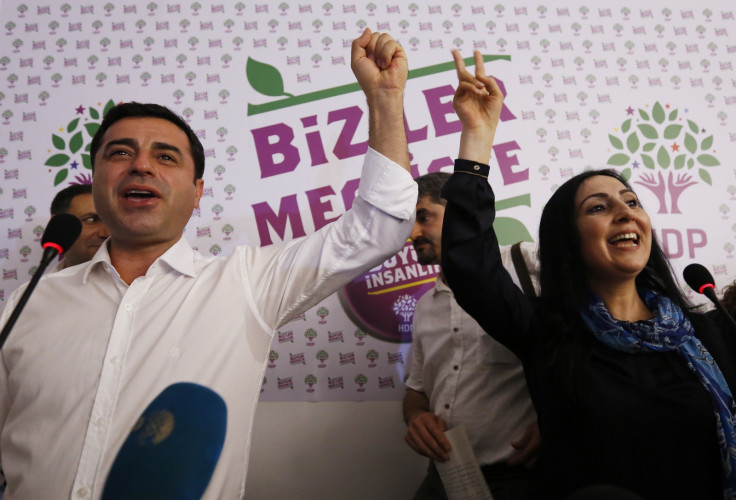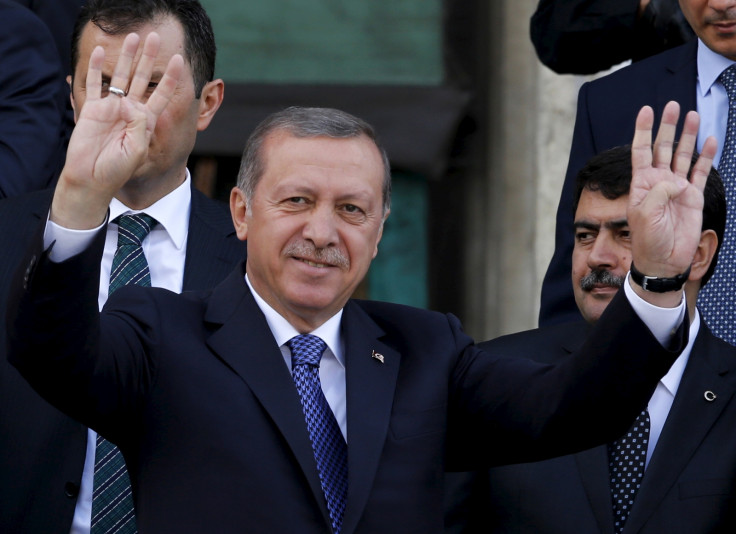Turkey elections: What does poll setback mean for the future of President Erdogan and AKP?

Turkey's parliamentary elections have seen the ruling AK Party (AKP) of president Recep Tayyip Erdogan losing the majority it had held for 13 years.
In a blow to Erdogan's ambitions to change the constitution and turn Turkey into a presidential regime, the AKP won only the 41% of all seats, representing a 8-point drop since the 2011 elections.
The real star of the elections was the pro-Kurdish People's Democratic Party (HDP), which passed the threshold to enter parliament by taking 13% of the vote on a broadened liberal platform.
"It's incredibly surprising. We expected the HDP to get some support but nobody thought it would be of this extent. It exceeded the expectations," Ege Seckin, political analyst at IHS, told IBTimes UK. "The AKP alienated the Kurdish people in Turkey and this is one of the main reasons we saw this result."
For the first time, many people who traditionally voted for the Republican People's Party (CHP), founded by Turkish national hero Mustafa Kemal Ataturk in 1923, tactically voted for the HDP, according to Seckin
Feeling the pressure and seeing polls and predictions, AKP deputies took an hawkish approach towards the Kurds and intensified their rhetoric against the Kurdistan Workers' Party (PKK), "contradicting the discourse and the spirit of the peace process", Seckin said.
For the first time since it took power in 2002, Erdogan's Islamist-rooted party will need to form a coalition government or try to rule with a weak minority.
The far-right Nationalist Movement party (MHP), hinted to be a possible coalition candidate, dismissed rumours of a deal with the AKP, saying the party was "ready to be a main opposition party against a possible AK-Party-CHP-HDP coalition".
The HDP has also ruled out governing in coalition with the AKP.
"The discussion of an executive presidency and dictatorship have come to an end in Turkey," HDP leader Selahattin Demirtas told a news conference in Istanbul, describing the outcome as a victory "for those who want a pluralist and civil new constitution".
Early elections

If the AKP fails to form a coalition within a 45-day window, the Turkish president will have to call for new elections, taking place no earlier than November.
Pro-government papers and AKP deputies have already called for early elections. Burhan Kuzu, head of the parliamentary constitution commission, told The Guardian that snap elections were "inevitable".
But despite the uncertainty, one main takeaway from these elections is that Erdogan's ambition to establish a presidential system is "out of the picture" at this point, Seckin said.
The conservative president, who has dominated Turkish politics for 12 years and been elected prime minister three times, wanted to abolish parliamentarianism and turn the Turkish democracy into a powerful executive presidency led by himself.
According to official results based on 99.9% of the votes counted, the AKP came first with 41%, followed by the Republican People's Party (CHP) on 25%, the MHP on 16.5% and the HDP at 13%.
Regardless of the outcome, the unrivalled power and pressure of the AKP in parliament is over according to Seckin. "Erdogan's party will have less power to exert pressure on the central bank and on the regulatory bodies to punish private sector groups that could be affiliated to the Gulen movement, for example," he said.
HDP's exceptional result also means that the peace process with the separatist PKK, which took up arms in 1984, will likely continue.
"The nightmarish scenario – in which the HDP failed to pass the threshold and Kurdish people started taking to the streets – did not happen and now the party is accepted by the country as a whole," Seckin said.
"This is positive for the Turkish majority even though it will lead to short-term uncertainty for policy-making," he said.
© Copyright IBTimes 2025. All rights reserved.






















